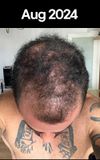community Diagnosed with female pattern hair loss as a male with recent aggressive loss. Preemptively mourning the only part of myself I’ve ever come close to loving. Lost all motivation to do anything with my life.
The conclusion of the conversation is that the user should consider using treatments such as finasteride, minoxidil, and RU58841 to potentially reverse their hair loss. Other suggestions include using hair loss concealers and maintaining a healthy diet.
